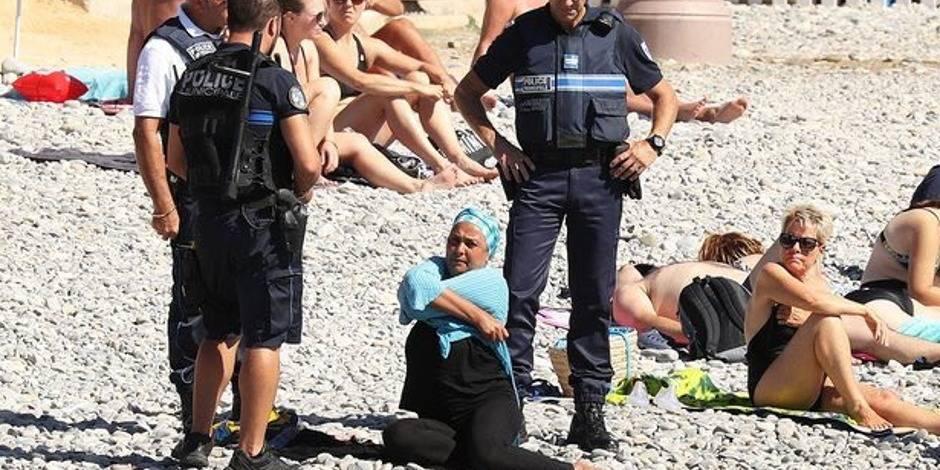“Clothes are a mode of social selection”
A man in the field, Christophe Barrand was headmaster for six years at the public Lycée Turgot in Paris. His establishment opened its doors to young people from disadvantaged neighborhoods by creating a program “School ambition hip-hop dance” in 2015. A way to open them up to excellence and academic success.
How would you see a "republican outfit"?
Of course there is no "republican outfit", the term was awkward. The Republic is there to protect our privacy, not to interfere. However, I emphasize that it is to the credit of our democracy to allow this debate to take place and to ask us these questions. This is not the case in all countries. The subject is delicate, because it comes to resonate with the social origin and the convictions of each one. What is acceptable for some is not for others. Moreover, our consumerist world means that our young people are caught up in a game of appearances, sensitive to fashions. The answer is educational, to be given in conjunction with the parents. It presupposes taking a step back on the way of dressing, on the influence of brands, which dictates successive fashions...
Have you yourself developed dress codes in your high school?
Clothing is not neutral. It returns a certain image. Personally, I have never felt compelled to wear a tie as a sign of competence. But, as headmaster, representative of authority, I put on a suit and leather shoes. Dress is also a sign of respect for others. I've never received anyone, neither parents nor students, dressed in tank tops and overalls, just as I've never gardened in a suit. In the same way, students must learn to adapt their outfit: sportswear is not street clothes, nor the one I am free to adopt at home. To be correct, the outfit must be appropriate, that's all.
We must support adolescents, teach them how to manage their intimate image. It is a question of affective and sexual education that we must all take up.

Feminists are rising up and claiming the right to dress as they see fit, without being seen as “sex objects”. Isn't that legit?
It is obvious that a boy does not have to pose a glance of sexual lust, of will of possession, nor of any domination on a girl. But let's open our eyes: today's teenagers, in the midst of a hormonal storm, are discovering sexuality through porn, via digital tools. Yes, they bathe in it and are caught up in it; yes, a naked body can disturb; yes, some behaviors are not acceptable. But no one was prepared for it. A high school student went to disciplinary council for having sent the parents of his girlfriend – who had just broken up – a sextape (video of their sexual relationship). As adults, we are dropped! But we must accompany them, teach them to manage their intimate image. It is a question of affective and sexual education which we must all take up: parents, teachers, associations.
And, in the meantime...
In theory, I am in favor of everyone doing what they please. But a principle of reality and safety of our minor students prevails. Need we remind you that a 9-year-old child was raped last Sunday? 15-year-old lolitas are coming out of our establishments, and sexual predators are not unaware of this. I adhere to all the beautiful and grand speeches that resonate but, as a man in the field, I invite pragmatism. Moreover, my thinking extends to the professional world. What profession accepts that one arrives in shorts or the navel in the air? To make young people believe that they can do anything, is this doing them a favor and helping them to project themselves into a professional life?
Is this the horizon we want for these young people from disadvantaged neighborhoods? Violence, delinquency, humiliated and mistreated girls, prison?
This dress standard would be enacted by the CSP+ white man and discriminate against suburban fashion, for example. You who welcomed these two populations within your establishment, what is your reaction?
It's complete demagoguery. Those who invite to exempt themselves from this norm are those who know the system perfectly, who will make their own children take the right options and will be able to rely on a comfortable network in their search for internships and fixed-term contracts. Reality, what is it? Clothing matters; it is a mode of social selection. It is also our role as educators to help them decipher the messages that young people send, very often without realizing it. Why this fashion for hoodies and pants below the buttocks, in the suburbs? The hoods were adopted to escape recognition from surveillance cameras, in the event of a deal or breakage. The pants that fall are from the American jailers who didn't have a belt. Is this the horizon we want for these young people from disadvantaged neighborhoods? Violence, delinquency, humiliated and mistreated girls, prison? Modeling on the "scum" is not a factor of progress or academic ambition.
Living in society means adapting to reality. But to play the game, you have to know the rules. However, some young people are completely unaware of dress codes.
Wearing a uniform, would that eliminate the problem?
I do not believe. The blouse would only hide the problem. And then it's a landmark of the 1950s. In France, it's no longer in our culture. Our role is to help students grow into the world as it is and not as we would dream it. However, I repeat, the Republic has a model of success to offer.
Living in society therefore presupposes adopting a form of conformity?
This means adapting to reality. It's a matter of fit and a sign of intelligence. But to play the game, you have to know the rules. However, some young people are completely unaware of dress codes. Myself from a very middle class, supposedly unfit for studies, I fought for years to find my place in society. I invited my students from disadvantaged neighborhoods to go and observe the outfits when they left Charlemagne or Sciences Po. The outfit often reflects the function, that's a fact. Our mission is to give young people the keys to this world and the means to make informed choices, aware of the issues. Then, their choices are their responsibility.
To be published: Monsieur le Principal, by Christophe Barrand, with Guillemette Faure, Grasset, €18.








